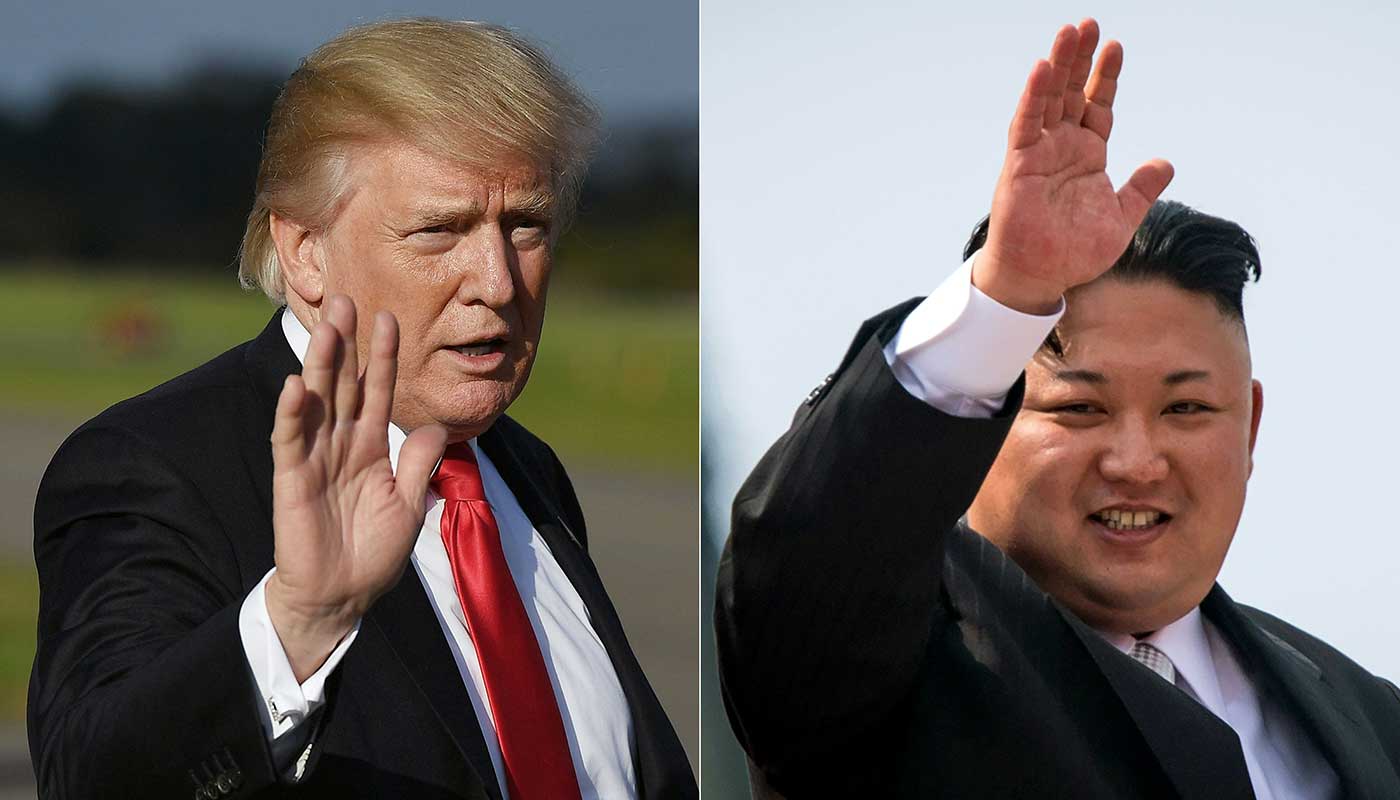Donald Trump reveals details of meeting with Kim Jong Un
Historic talks set to take place in Singapore on 12 June

A free daily email with the biggest news stories of the day – and the best features from TheWeek.com
You are now subscribed
Your newsletter sign-up was successful
Donald Trump: the Russia memo unravelled
2 February
A four-page Republican memo that reportedly accuses the FBI of abusing their powers to spy on one of the US President’s campaign aides could be declassified soon.
“Trump has the power to declassify the document himself and either release it or hand it to Congress to release,” the BBC says.
The Week
Escape your echo chamber. Get the facts behind the news, plus analysis from multiple perspectives.

Sign up for The Week's Free Newsletters
From our morning news briefing to a weekly Good News Newsletter, get the best of The Week delivered directly to your inbox.
From our morning news briefing to a weekly Good News Newsletter, get the best of The Week delivered directly to your inbox.
The lead-up to the controversy has been a “Saturday Night Massacre in slow motion,” writes Norm Eisen, the former White House ethics lawyer, in Politico. The words refer to Richard Nixon’s firing of Department of Justice officials during the Watergate scandal in the 1970s.
What’s thought to be in the memo?
Compiled by Devin Nunes, the Republican chairman of the House Intelligence Committee, the document “reportedly suggests that FBI officials abused their power in seeking to wiretap Carter Page, a Trump campaign aide,” says the Financial Times.
The memo is said to argue that the FBI and Justice Department did not tell the judge that some of their justification for the warrant relied on a much-disputed Trump dossier.
A free daily email with the biggest news stories of the day – and the best features from TheWeek.com
Unnamed sources told Reuters that the Republican memo was “misleading because all the dossier excerpts used in the FBI warrant application were independently confirmed by US intelligence”.
Who wants its release?
Donald Trump. He wants the document to be published “because he sees it as key to making changes at the Justice Department, particularly pushing out Deputy Attorney General Rod Rosenstein, who oversees special counsel Robert Mueller’s investigation,” reports the Washington Post.
CNN says “Trump has told friends he believes the memo would expose bias within the FBI’s top ranks and make it easier for him to argue the Russia investigations are prejudiced against him.”
A Republican member of the House, Jeff Duncan, predicts in a tweet that the memo will shake the FBI “down to its core” and show “Americans just how the agency was weaponised” by Barack Obama’s administration and the Democratic Party to “target political adversaries”.
Who doesn’t want its release?
The FBI. The furore pits Christopher Wray, the FBI’s new director, against Trump, “the man who appointed him,” says the FT.
On Wednesday the FBI said it opposed the document’s release because it may contain misleading characterisations of the Russia investigation. The Democrats don’t want the memo released either. They have accused Republicans of amending the memo after it was approved.
What are the ramifications of its release?
The Justice Department, which oversees the FBI, warns that the memo could jeopardise intelligence gathering and damage trust between the agency and lawmakers.
But if the ultimate goal of the memo is to shut down the Mueller investigation, “the immediate target is Deputy Attorney General Rod Rosenstein, the only official who can sack Mueller – and then only if he can prove that the special counsel has been guilty of misconduct,” says Kim Sengupta in The Independent.
1 February
Donald Trump orders Guantanamo Bay to stay open
Guantanamo Bay is to remain open after Donald Trump signed an executive order reversing Barack Obama’s eight-year-long attempt to close it.
Obama was frustrated in his efforts in large part because of opposition in Congress and an unwillingness to release suspected terrorists or transfer them to maximum-security prisons on US soil.
Opened in the aftermath of the 9/11 attacks by George W. Bush, Guantanamo became a byword for US excesses during the War on Terror and a powerful recruiting tool for Islamic extremists. Many of those imprisoned were held without trial, while accusations of torture and inhumane treatment made the camp a focus for anti-American sentiment following the invasion of Iraq.
During his presidential campaign, Trump promised to reverse the Obama-era policy of releasing suspects by loading Guantanamo up “with some bad dudes”. No new prisoners have come to the prison in more than a decade, but that could now change.
The Independent says Trump has the backing of a vocal group of prominent Republicans, including senators Lindsey Graham and John McCain, “both of whom believe terror suspects should be tried through the military commission process rather than in civil court”.
While the new directive does nothing to resolve the legal quandary dating to the Bush administration, “it does require the secretary of defense to recommend within 90 days a method for determining the fate of individuals captured by the US forces”, says NPR.
Lee Wolosky, Obama’s special envoy at the State Department for closing Guantanamo, told the Associated Press that in a practical sense, not much will change with the new order.
“But as a symbolic matter, it changes a great deal because the two presidents before [Trump] were trying to close Guantanamo because they recognized that it was a detriment to our national security,” he said. “Symbolically, it reaffirms his interest in perpetrating a symbol that has greatly damaged the United States.”
Trump strikes conciliatory note in State of the Union speech
31 January
Donald Trump delivered his first State of the Union address in Washington last night, using the 80-minute speech to call for reconciliation between the country’s two major political parties and to outline his administration’s “four-pillar plan” for immigration.
“Let us begin tonight by recognising that the state of our Union is strong because our people are strong. And together, we are building a safe, strong, and proud America,” Trump said.
The US President sought to recap some of the successes of his first year in office, including the creation of 2.4 million new jobs, moving unemployment levels to their lowest in 45 years.
Trump sought to “infuse his maiden State of the Union address with an undercurrent of optimism,” CNN says, but even as he tried to bridge the growing divisions in US politics, “he didn't avoid the dark warnings about immigrants and nods to populist nationalism that have helped foment disunity over the past year.”
Addressing immigration, Trump revealed a four-part plan to tackle the issue that has been a central concern of his administration’s first year in office.
The four “pillars” of the immigration plan are:
- “A path to citizenship for 1.8 million illegal immigrants who were brought here by their parents at a young age”
- “Fully securing the border. That means building a wall on the Southern border.”
- “Ending the visa lottery – a program that randomly hands out green cards without any regard for skill, merit, or the safety of our people.”
- “Protecting the nuclear family by ending chain migration.”
The New York Times reports that as Trump spoke about the fourth pillar of his plan, “Democrats scowled, then began to boo and hiss.”
Trump also called on Congress to work together to produce a $1.5 trillion infrastructure proposal to rebuild the country’s road network, bridges and sewer systems.
The President ended his speech by talking about national security, vowing to continue to fight Islamic State. He also announced he had “signed an order directing [Defence] Secretary Mattis to re-examine our military detention policy and to keep open the detention facilities at Guantanamo Bay.”
Democratic reaction to the speech was delivered by Massachusetts representative Joseph Kennedy III, a great-nephew of President John F Kennedy, and Vermont Senator Bernie Sanders.
Kennedy took aim at the record of the Trump administration, saying that Russia is “knee-deep in our democracy”, and that there was currently “hatred and supremacy proudly marching in our streets.”
Sanders, in his unofficial response, criticised Trump personally, saying: “The American people do not want a president who is compulsively dishonest, who is a bully, who actively represents the interests of the billionaire class, who is anti-science.”
Donald Trump faces trade retaliation, says EU
30 January
The European Union has said it will react swiftly and aggressively if Donald Trump goes through with his threat to restrict its imports.
In response, a European Commission spokesman said the EU did not view trade as a zero-sum game, but added that “while trade has to be open and fair it has also to be rules-based”.
“The European Union stands ready to react swiftly and appropriately in case our exports are affected by any restrictive trade measures from the United States,” he said.
In a sign that the Trump administration is beginning to back up its tough talk on trade in support of the president’s ‘America First’ policy, the White House last week imposed tariffs of up to 30% on washing machines and solar panels.
Reuters says the move was “among the first unilateral trade restrictions made by the administration as part of a broader protectionist agenda”. It provoked widespread condemnation from South Korea and China - and increased the possibility of an all-out trade war between the world’s two biggest economies.
The EU also attacked the tariff hike, saying it had serious doubts it was compatible with World Trade Organisation rules and warning it could have a knock-on effect on EU exports.
Donald Trump ‘called for Mueller to be fired in June’
26 January
Donald Trump called for special counsel Robert Mueller, who is investigating links between senior Trump aides and Russia, to be fired in June last year, according to the The New York Times.
The paper says that Trump eventually backed down after White House lawyer Don McGahn “threatened to resign rather than carry out the directive”.
The US President’s alleged instruction came amid a wave of media reports that Mueller was examining a possible obstruction of justice case involving the Trump administration.
Trump also argued that Mueller’s work for a law firm that represented his son-in-law Jared Kushner, and the fact that Mueller had been interviewed to replace former FBI director James Comey the day before he was appointed special counsel, made him unfit for the job.
McGahn reportedly refused to ask the Justice Department to remove Mueller on the basis that the move would have a “catastrophic effect on Trump’s presidency.”
Mark Warner, a senior Democrat on the Senate Intelligence Committee, said that firing the special counsel would be a “gross abuse of power” and a “red line that the President cannot cross”, CNN reports. Other Democrats have renewed calls for Congress to pass legislation that would “protect Mueller and future special counsels from being fired by the president”, says The Washington Post.
Ty Cobb, the White House lawyer reponsible for Trump’s relationship with the Mueller investigation, declined to comment “out of respect for the Office of the Special Counsel and its process”.
Donald Trump ‘looking forward’ to Mueller interview - under oath
25 January
Donald Trump has said he is “looking forward” to speaking with special counsel Robert Mueller as part of the probe into alleged Russian meddling in the US presidential election.
When asked by reporters whether he was going to talk to Mueller, Trump said: “Here is the story: there has been no collusion whatsoever. There is no obstruction whatsoever. And I am looking forward to it.”
Trump went on to say that he would be prepared to do the interview under oath, however that would be “subject to my lawyers.”
When asked when the interview would take place, Trump said he “would love to do that as soon as possible” and suggested it could happen in “two to three weeks”.
Two weeks ago, Trump said that he thought it “unlikely” he would be interviewed by Mueller.
-
 Sean Bean brings ‘charisma’ and warmth to Get Birding
Sean Bean brings ‘charisma’ and warmth to Get BirdingThe Week Recommends Surprise new host of RSPB’s birdwatching podcast is a hit
-
 Film reviews: ‘Send Help’ and ‘Private Life’
Film reviews: ‘Send Help’ and ‘Private Life’Feature An office doormat is stranded alone with her awful boss and a frazzled therapist turns amateur murder investigator
-
 Movies to watch in February
Movies to watch in Februarythe week recommends Time travelers, multiverse hoppers and an Iraqi parable highlight this month’s offerings during the depths of winter
-
 Trump wants a weaker dollar, but economists aren’t so sure
Trump wants a weaker dollar, but economists aren’t so sureTalking Points A weaker dollar can make imports more expensive but also boost gold
-
 Leadership: A conspicuous silence from CEOs
Leadership: A conspicuous silence from CEOsFeature CEOs were more vocal during Trump’s first term
-
 The end for central bank independence?
The end for central bank independence?The Explainer Trump’s war on the US Federal Reserve comes at a moment of global weakening in central bank authority
-
 Can Trump make single-family homes affordable by banning big investors?
Can Trump make single-family homes affordable by banning big investors?Talking Points Wall Street takes the blame
-
 Phish food for thought: Ben & Jerry’s political turmoil
Phish food for thought: Ben & Jerry’s political turmoilIn the Spotlight War of words over brand activism threatens to ‘overshadow’ the big ice cream deal
-
 What a rising gold price says about the global economy
What a rising gold price says about the global economyThe Explainer Institutions, central banks and speculators drive record surge amid ‘loss of trust’ in bond markets and US dollar
-
 US mints final penny after 232-year run
US mints final penny after 232-year runSpeed Read Production of the one-cent coin has ended
-
 Argentinian beef is at the center of American farmers’ woes
Argentinian beef is at the center of American farmers’ woesThe Explainer ‘It feels like a slap in the face to rural America,’ said one farmer